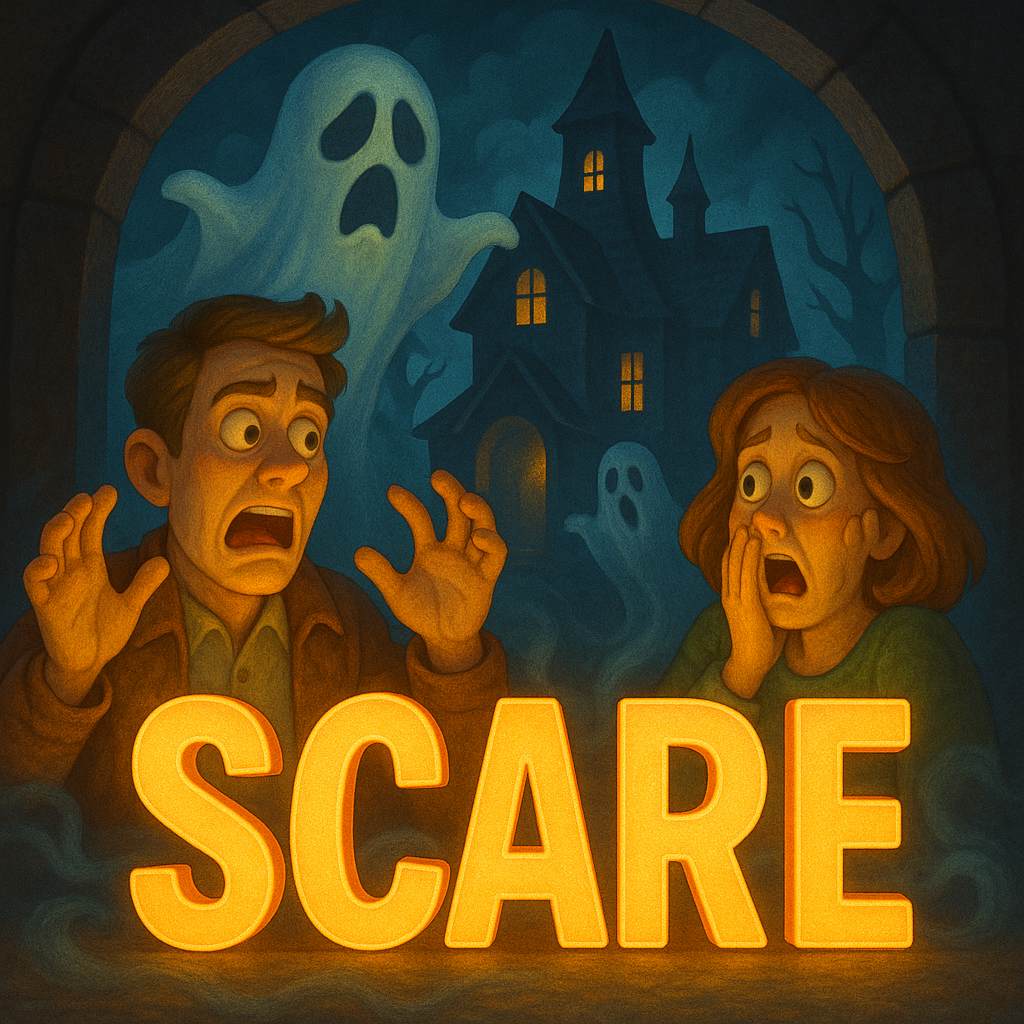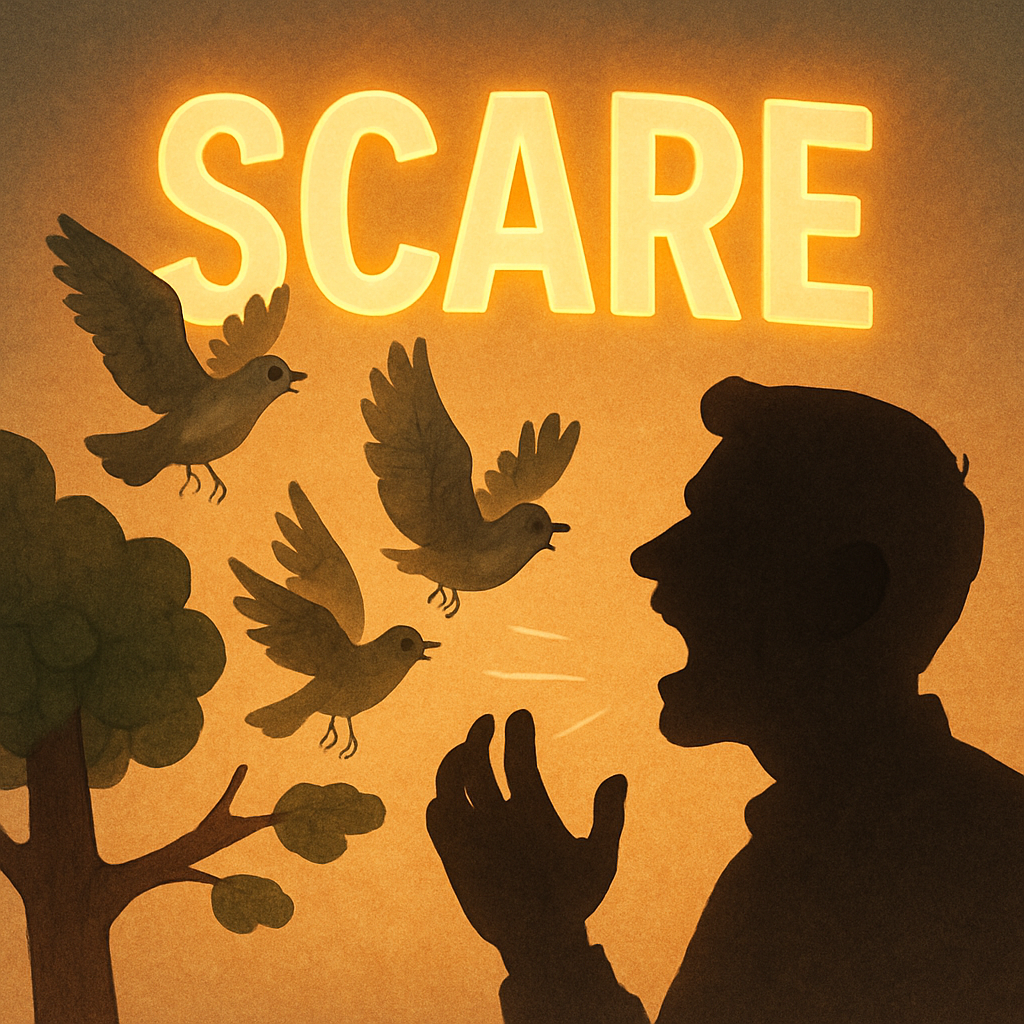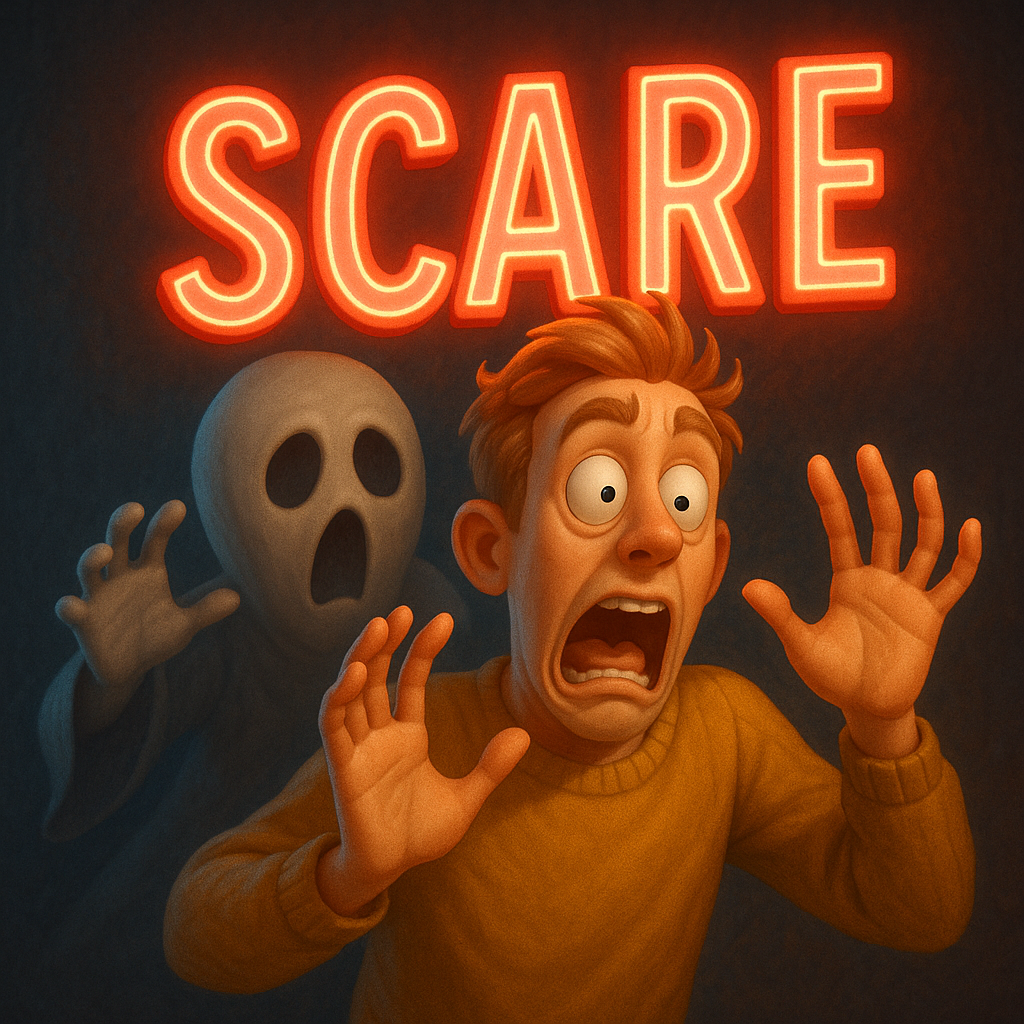Scare
Definition
Scare can function as a verb meaning to cause fear or alarm in someone, and as a noun referring to a sudden feeling of fright or alarm; it may also denote an incident likely to induce fear. Its plural form as a noun is scares.
Parts of Speech
- Verb (transitive/intransitive)
- Noun
Pronunciation
American English
- IPA: /skɛr/
- Respelling: SKAIR
British English
- IPA: /skeə/
- Respelling: SKAIR
Etymology
Mid 16th century: from Middle English scaren ‘frighten,’ possibly from Old Norse skirra ‘to frighten,’ ultimately of uncertain origin.
Derivatives
- scared (adjective)
- scary (adjective)
- scarer (noun)
- scarecrow (noun)
- scare away/off (phrasal verb)
Synonyms
- frighten
- alarm
- terrify
- startle
- panic
Antonyms
- comfort
- reassure
- calm
- soothe
- encourage
Usage
"Loud thunder can scare small children."
"The sudden blackout gave everyone a real scare."
Related Terms
- Fear: An unpleasant emotion caused by threat or danger.
- Fright: A sudden intense feeling of fear.
- Panic: Sudden, uncontrollable fear or anxiety.
- Alarm: A signal or feeling of warning and fear.
- Terror: Extreme fear.
Detailed Definitions
Verb
- To cause fear or alarm in someone – to arouse fear or a feeling of apprehension in a person.
- Example: "The haunted house scared the visitors."
- To frighten away or drive off – to cause someone or something to run away in fear.
- Example: "The stranger’s shout scared the birds from the tree."
- Colloquial: To startle or surprise someone suddenly – to provoke a sudden shock or fright.
- Example: "Don’t sneak up on me like that—you nearly scared me to death!"
Noun
- A sudden feeling of fear or alarm – a brief experience of fright.
- Example: "He got quite a scare when the dog barked."
- An incident causing fear or alarm – an event that triggers a feeling of fear or panic.
- Example: "The power outage was just a scare, not a real emergency."
- An attempt to frighten someone as a prank or warning – an act intended to startle or alarm another person.
- Example: "The children played a scare on their friend by hiding in the closet."
scare



🇨🇳 Mandarin
- 吓 (xià)
- IPA Pronunciation: /ɕjɑ˨˩˦/
- Respelling in English: shya
- 恐吓 (kǒng xià)
- IPA Pronunciation: /kʰʊŋ˨˩˦ ɕjɑ˨˩˦/
- Respelling in English: kong shya
🇮🇳 Hindi
- डर (ḍar)
- IPA Pronunciation: /ɖər/
- Respelling in English: dar
- भय (bhaya)
- IPA Pronunciation: /bʱəja/
- Respelling in English: bhayaa
🇪🇸 Spanish
- asustar
- IPA Pronunciation: /asuˈstar/
- Respelling in English: ah-soo-star
- espantar
- IPA Pronunciation: /espanˈtar/
- Respelling in English: es-pan-tar
🇫🇷 French
- effrayer
- IPA Pronunciation: /ef.ʁe.je/
- Respelling in English: ef-ray-yey
- scare
- IPA Pronunciation: /skaʁ/
- Respelling in English: skar
🇸🇦 Modern Standard Arabic
- خوف (khawf)
- IPA Pronunciation: /xawf/
- Respelling in English: khawf
- رعب (raʿb)
- IPA Pronunciation: /raʕb/
- Respelling in English: ra'ab
🇧🇩 Bengali
- ভয় (bhoy)
- IPA Pronunciation: /bʰɔj/
- Respelling in English: bhoy
- ডাকাতি (ḍākāti)
- IPA Pronunciation: /ɖakati/
- Respelling in English: daakaa-tee
🇷🇺 Russian
- пугать (pugat')
- IPA Pronunciation: /pʊˈɡatʲ/
- Respelling in English: poo-gat
- испуг (ispug)
- IPA Pronunciation: /ɪˈspuk/
- Respelling in English: is-pook
🇵🇹 Portuguese
- assustar
- IPA Pronunciation: /aʃuʃˈtaɾ/
- Respelling in English: ah-shoosh-tar
- amedrontar
- IPA Pronunciation: /amɛdɾõˈtaɾ/
- Respelling in English: ah-med-ron-tar
🇮🇩 Indonesian
- mengagetkan
- IPA Pronunciation: /mə.ŋa.ˈɡət.kan/
- Respelling in English: meng-ah-get-kan
- menakutkan
- IPA Pronunciation: /mə.na.ˈkut.kan/
- Respelling in English: mena-koot-kan
🇩🇪 German
- erschrecken
- IPA Pronunciation: /ɛʁˈʃʁɛkən/
- Respelling in English: er-shrek-ken
- ängstigen
- IPA Pronunciation: /ˈɛŋstɪɡən/
- Respelling in English: eng-sti-gen
🇯🇵 Japanese
- 怖がる (kowagaru)
- IPA Pronunciation: /ko̞wa̠ɡa̠ɾɯ̟ᵝ/
- Respelling in English: kowah-gah-ru
- 驚かせる (odorokaseru)
- IPA Pronunciation: /o̞do̞ɾo̞ka̠se̞ɾɯ̟ᵝ/
- Respelling in English: oh-doh-ro-kah-se-ru
🇻🇳 Vietnamese
- làm sợ
- IPA Pronunciation: /lam˧˩ sɔː˧˩/
- Respelling in English: lam so
- hoảng sợ
- IPA Pronunciation: /hwaŋ˨˩ sɔː˧˩/
- Respelling in English: hwang so
🇰🇷 Korean
- 무서워하다 (museowohada)
- IPA Pronunciation: /mu.sʌ̹.wo.ha.da/
- Respelling in English: moo-seo-wo-ha-da
- 깜짝 놀라다 (kkamjjak nollada)
- IPA Pronunciation: /kʰam.d͡ʑak̚ no̞l.la.da/
- Respelling in English: kham-jjak nol-la-da
🇹🇷 Turkish
- korkutmak
- IPA Pronunciation: /korˈkut.mak/
- Respelling in English: kor-koot-mak
- ürkmek
- IPA Pronunciation: /yrkˈmek/
- Respelling in English: urk-mek
🇵🇰 Urdu
- ڈرانا (ḍarānā)
- IPA Pronunciation: /ɖəˈraː.naː/
- Respelling in English: dar-aa-na
- خوف دلانا (khawf dilānā)
- IPA Pronunciation: /xɔf dɪˈlaː.naː/
- Respelling in English: khawf di-laa-na





